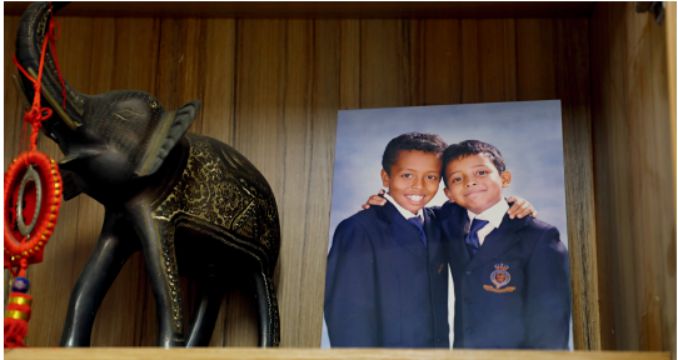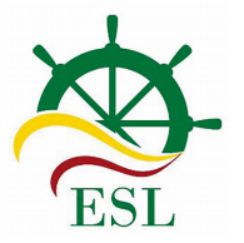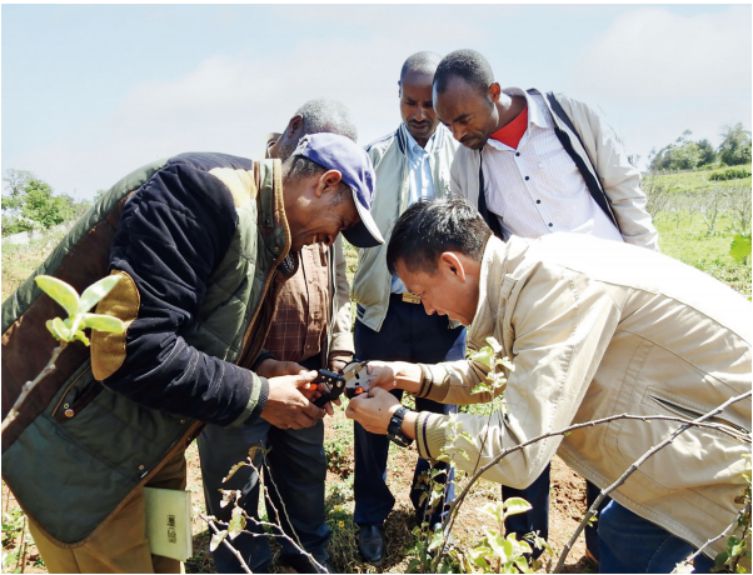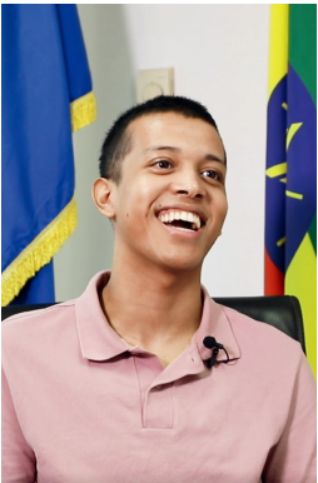Lewis Aschalew
Born in Ethiopia in 1968, Lewis Aschalew graduated from the University of Science and Technology Beijing in 1992. He joined Ethiopian Shipping Lines in 1994 and is currently the Chief Representative of the company in China.

“Doing business in China requires ‘taking it to heart’. An unfeeling person won’t get far here.” This is the secret of Lewis Aschalew, chief representative of Ethiopian Shipping Lines, after conducting business in China for more than 30 years.
In 1987, the 19-year-old Aschalew came to study at the University of Science and Technology Beijing. After graduation, he entered the Chinese business world. “I’ve spent most of my adult life in China.” When saying this, Aschalew looked at his son Xiaolong beside him with loving eyes and said smilingly: “Now I’m turning 60. Looking back, what an incredible adventure this half of my life has been!”
So, how did this “heartfelt” adventure begin?
Curiosity: Stemming from Small Chinese Gadgets
Aschalew’s curiosity about China began with a few small objects at home.
“I’ve always had a natural business intuition and have been very interested in doing business. When I was a kid, many Chinese products were in my house. My mother had a Chinese enamel teapot with the words ‘Shanghai, China’ written on it. A Shanghai company also produced the cosmetics she normally used. Some people might think these are just insignificant little things in life, but back then, I wondered: How were these products shipped to Ethiopia? What business opportunities were there behind this?”

The Chinese knot, African crafts, and photos of his children on Aschalew's office bookshelf.
During middle school, Aschalew gained a deeper understanding of China: “One knowledgeable teacher of mine often lectured on Chinese history and geography in class. I learned about the Yangtze River, the Yellow River, and the Great Wall from him. He also told us about Beijing. So, before I came to China, I already knew about places like Wangfujing, Xidan, and Beihai.”
“Of course, the most famous Chinese person in our country was Chairman Mao.” Aschalew said, “At that time, many Ethiopian youth read Chairman Mao’s works. Even those who knew little about Chinese history knew that Chairman Mao led the Chinese revolution and founded New China. This was the first impression many Ethiopians had of China.”
After China embarked on reform and opening up, Aschalew quickly noticed this historical trend: “China is a huge and ancient country with a vast market. If China opened up, opportunities would surely come along. At that time, most of my understanding of China came from books, but my intuition told me it would be a land of opportunity! Not many Ethiopians studied in China back then, but I decided to ‘take a gamble’ and come to China to attend university.”
This African youth’s “Great Adventure in China” thus began.
Aschalew admitted: “When I first came to China in the 1980s, to be honest, I was a bit disappointed. Before coming to China, I thought China was a very developed country. However, when I arrived, I found that even in Beijing, there were still dirt roads. Some people in the countryside were still using horse-drawn carriages. I was vaguely worried that my choice might have been wrong.”
But soon, Aschalew, who was good at observing, discovered the interesting aspects of China: “When I was at college, I often traveled around Beijing. I found many interesting things then. For example, the walking tractors in Chinese rural areas looked simple and crude, yet they were super light and easy to operate. Not only could they be used to plow fields but also could work as a means of transportation, significantly improving farmers’ production efficiency. During the same period, many rural areas of Africa were still using oxen for farming. Therefore, I thought if this tractor could be introduced to Ethiopia, it would surely be popular among farmers.”
Aschalew then gradually reassured himself and began to study earnestly in China: “My school was the University of Science and Technology Beijing, formerly known as Beijing Institute of Iron and Steel. Our computer science and materials science majors are among the top in China, correspondingly requiring excellent daily performance. One of my classmates failed the physics course three times, but fortunately ‘passed’ in the end without delaying his graduation.
Aschalew said that the most unforgettable part of university was his teachers: “Because of language barriers, we international students initially struggled with learning. One of my computer teachers would call us for extra lessons after class to prevent our grades from falling behind. Our life teacher treated us like family members, often taking us around Beijing on weekends and occasionally inviting me to his home for dinner. Besides, we organized football matches on campus, with teams from China, Africa, and Europe competing together. We had a lot of fun.”
“Some time ago, I took my son back to my alma mater, hoping to visit my former teachers. Surprisingly, it turned out that all the teachers I knew had retired. On second thought, since I, as a student, am almost 60 years old, no wonder the teachers have all retired!” Aschalew said with a laugh.
In 1992, Aschalew graduated from university. This ambitious Ethiopian young man was ready to make a splash in the heat of China’s reform and opening up.
Experience: Doing Business Requires Bonds of Friendship
Soon after graduation, Aschalew together with several classmates first provided consulting services for African businessmen coming to China. “We all sensed at that time that the Chinese market would see long-term rapid growth. We foreign students who could speak Chinese would have a role to play. Later, we gradually accumulated experience and began to do foreign trade business ourselves, exporting textiles and building materials made in China to Africa.”
In 1994, Aschalew established the Ethiopian Shipping Line’s representative office in China. “At that time, although it was called ‘representative office’, I was the only one permanently stationed in China. My daily work was to meet with businessmen introduced by the Ethiopian Embassy in China, take them around the Chinese factories, and accompany them to negotiate contracts with Chinese bosses. This job was not easy at first, but as we gradually laid a solid foundation, it became smoother and smoother.”

The logo of Ethiopian Shipping Lines.
Perhaps because of his computer science background, Aschalew was also quite sensitive to new technological developments. He said that he started communicating with Ethiopia by telegram, and in 1996, he used a mobile phone for the first time, before becoming the first person in the representative office to use email. “Now with 5G, we almost have seamless connectivity between Ethiopia and China, which is also a living example of technology facilitating economic openness.”
Over the past 30 years, Aschalew has traveled almost all over China and witnessed the process of China’s reform and opening up. “In 2001, China joined the World Trade Organization (WTO). It remains fresh in my memory. Before joining the WTO, we had to deal with a mountain of import and export documents every time our cargo ship arrived in a country. After that, our work became much easier and the cost of international freight was reduced as well.”
As he traveled around China, Aschalew also gained a deep understanding of China’s industrialization achievements: “Our initial business partners were mainly concentrated in Shanghai, Guangdong, and Liaoning. With the development of the coastal economy, enterprises in Zhejiang and Fujian began to rise, especially the manufacturers in Wenzhou, Zhejiang, with whom we do a lot of business. The quality of Chinese products has also been getting better and better. Later on, some traditional agricultural provinces also began to develop manufacturing. For example, many years ago, we went to Shandong mainly for spices and apples; for now, we purchase precision industrial machinery there.”
Aschalew appreciates Chinese business culture: “No matter how rich Chinese entrepreneurs are, they are modest and friendly and never show off. But this doesn’t mean that business negotiations in China are easy. In China, if you want to do business, you first need to understand what ‘taking it to heart’ means. Some people think that business is all about the exchange of interests. However, in reality, doing business in China also covers ‘mutual help and care’. To establish such a relationship, you must make friends all over the country. If you fail to understand these bonds of friendship, it will be hard for you to do business in China.”
Nowadays, as China-Africa cooperation enters a new era, Aschalew, a “veteran” who has been in the Chinese business world for more than 30 years, also sees more new opportunities.
Hope: Settling in Renminbi
On September 5, the opening ceremony of the Beijing Summit of the Forum on China-Africa Cooperation (FOCAC) was held in Beijing. At the opening ceremony, President Xi Jinping announced that the Chinese government will provide RMB360 billion yuan of financial support over the next three years. This breaks down into RMB210 billion yuan of credit line, RMB80 billion yuan of assistance in various forms, and at least RMB70 billion yuan of investment in Africa by Chinese companies. In addition, China will encourage and support Africa in issuing “panda bonds” in China to enhance our results-oriented cooperation in all areas.
Aschalew said that he is very grateful for China’s help to Africa. “Now that China has given Africa such great support, the rest depends on how Africa absorbs China’s experience to achieve better development.”
During the summit, China announced a tariff-free policy for 33 African countries, including Ethiopia. Aschalew believes this reflects the advantages of China-Africa cooperation: “Some countries often put pressure on Africa through economic sanctions when trading with African countries, but China has never done so.”
Aschalew supposes that the next step in strengthening China-Africa trade ties is to enhance the level of financial cooperation between the two sides: “Take my motherland as an example. China is Ethiopia’s main trading partner, but a large portion of our trades cannot be settled in local currency. Instead, we have to use a third-party currency for trade, which increases the trade costs between our two countries. Currently, the usage rate of RMB in Africa is still low. I hope that with further cooperation, both sides can directly use RMB for settlement in trade. This is also conducive to reducing the economic burden of African countries.”
Apart from China-Africa trade, Aschalew is also concerned about China-Africa industrial cooperation. In his eyes, the characteristic of Chinese investment is “teaching one how to fish”. “In the previous decades, there has been much international aid to Africa, but none of them changed the living standards of Africans. China’s aid is different: China not only brings investment, but also new technologies and production methods, which are urgently needed for Africa’s development. Africa’s history books will surely record China’s assistance to the continent.”
Aschalew said that many people are now talking about Africa’s industrialization, but the prerequisite for industrialization is solving the food problem. “Agriculture in Africa is still relatively backward today, especially lacking fertilizers and breeding technologies. China has solved the food issue for its people. I hope Ethiopia can introduce more Chinese agricultural technologies and poverty reduction experiences in the future. Only by ensuring people’s basic living needs can we discuss Africa’s industrialization process in a down-to-earth manner.”

In 2019, a Chinese expert (on the far right) taught grafting techniques for fruit trees to Ethiopian farmers.
In recent years, more and more Chinese investors have come to Africa to seek opportunities. Aschalew is pleased to see this, yet he stated that just as he has integrated himself into China’s business environment, Chinese entrepreneurs should also fully understand the local situation when doing business in Africa. “For example, some African countries have their unique systems in account auditing and employee hiring. Before investing in these countries, Chinese entrepreneurs should conduct relevant research and preparations in advance, and cannot blindly apply their business experience from China to Africa. I hope to see a Chinese-language Investment Guide to Africa someday to help Chinese entrepreneurs better understand Africa.”
Aschalew’s son, Xiaolong, who has just graduated from university, said, “I was born in the Year of the Snake, so my parents gave me the nickname ‘Xiaolong’ (little dragon).” As a native Beijinger, Xiaolong is full of confidence in the future China-Africa cooperation and plans to make a difference in China-Africa trade. He told the reporter: “Africa is a vast and vibrant market and quick to accept new things. Many products we take for granted in China can quickly become ‘hits’ in Africa. And many high-quality African products can also meet the new needs of Chinese consumers.”

Aschalew's second son, Xiaolong.
The reporter noticed that the whiteboard in Aschale’s company’s meeting room was covered with plans for the company’s future projects written in Chinese, among which the word “咖啡” (coffee) is very prominent. Xiaolong explained with a smile: “This is the result of brainstorming between my father and me. Ethiopia is abundant with high-quality coffee beans, while China’s demand for coffee is constantly increasing today. We plan to set up a coffee company in China in the future and introduce Ethiopia’s high-quality coffee beans to the Chinese market.”
Looking at Xiaolong excitedly discussing the prospects of China-Africa trade in front of the reporter, Aschalew’s eyes were filled with pride. It seems the baton of China-Africa economic and trade cooperation will surely be passed on.
 Editor:Zheng Aotian
Editor:Zheng Aotian